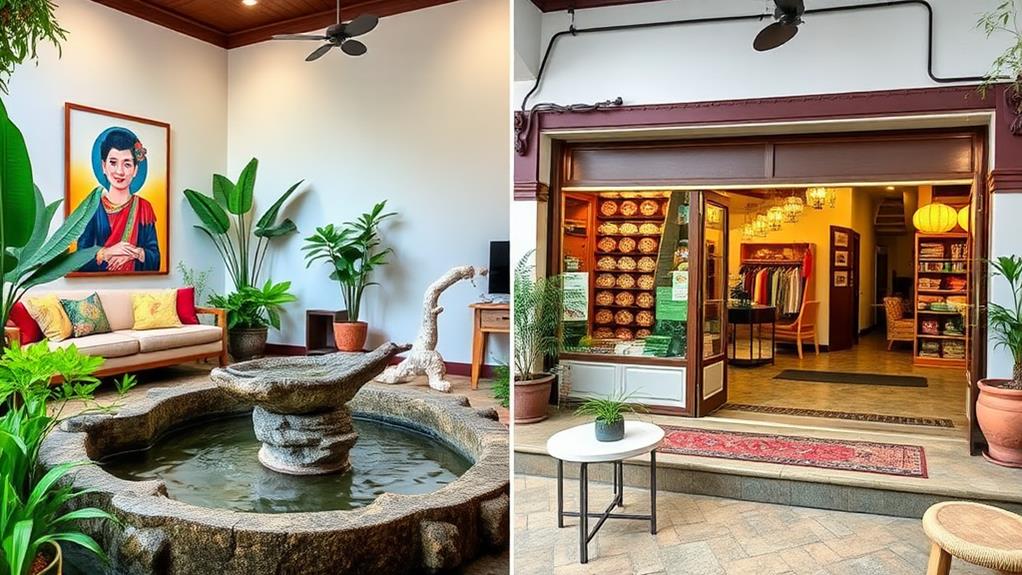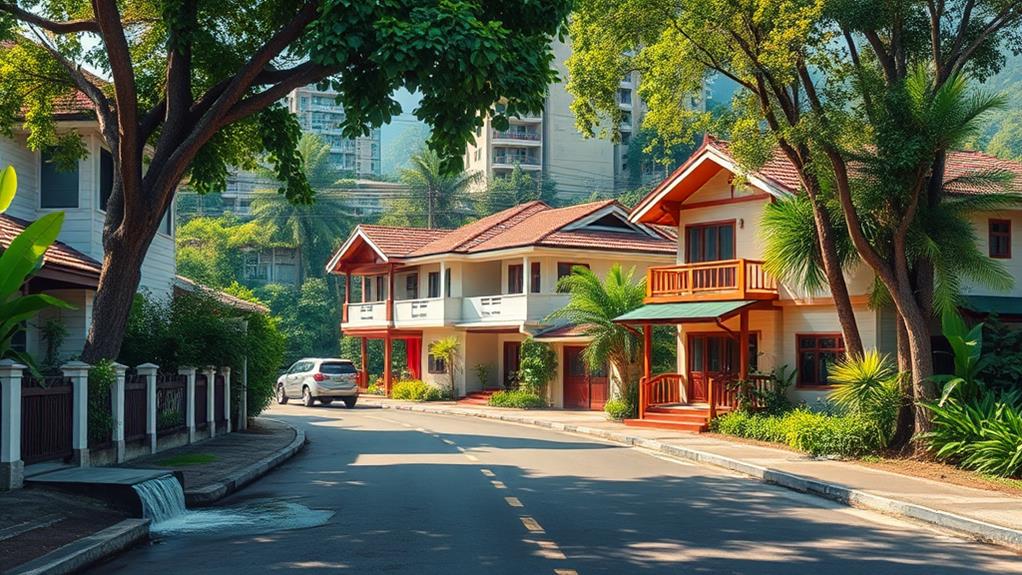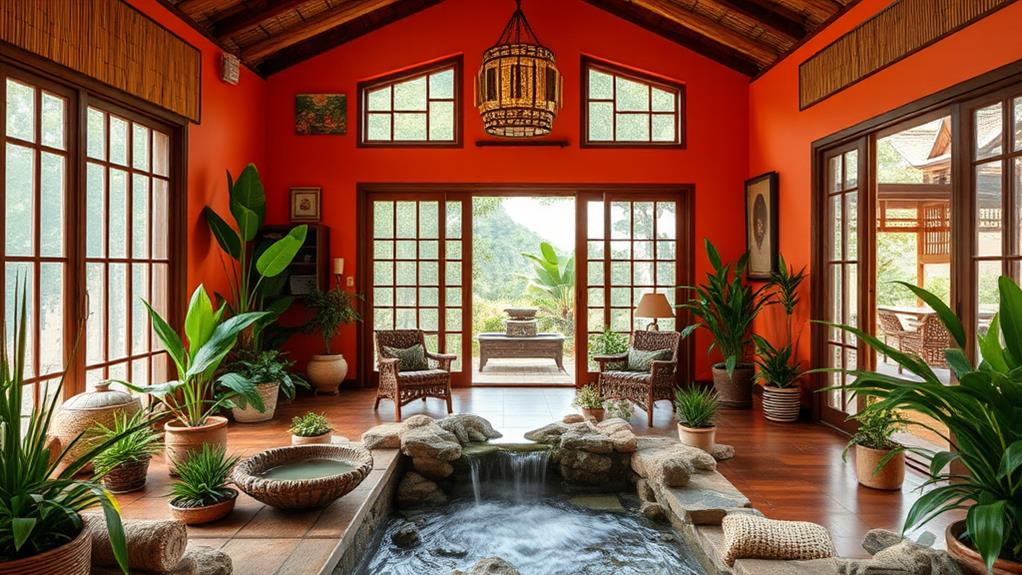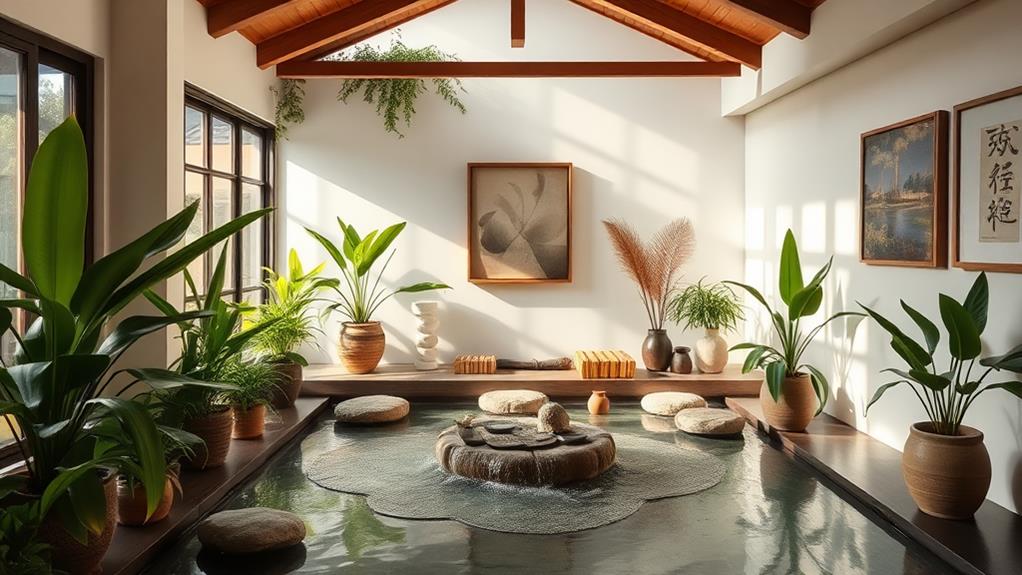Feng Shui's Impact on Filipino Spaces
Feng Shui has become an integral part of Filipino homes and businesses, as it creates spaces that radiate positive energy.
By balancing the five elements – wood, fire, earth, metal, and water – individuals can invite serenity and prosperity into their lives. For instance, a strategically placed east-facing front door draws in natural sunlight and good fortune.
The Bagua Map: A Design Guide
The Bagua map is a valuable tool that guides design choices, ensuring each corner of a space exudes harmony.
By dividing a space into nine areas, each corresponding to a different aspect of life, individuals can target specific areas for improvement. This ancient art seamlessly blends with local beliefs, creating a nurturing environment.
Feng Shui in Businesses
In businesses, thoughtful layouts can enhance customer experience and boost employee morale, paving the way for success.
For example, a well-designed reception area can create a welcoming atmosphere, while a carefully planned workspace can increase productivity.
By incorporating Feng Shui principles, businesses can create a competitive edge.
Overview of Feng Shui Principles

Feng Shui principles aim to harmonize Chi, or energy, in a space to promote well-being. This ancient practice balances the five elements – wood, fire, earth, metal, and water – to cultivate a flow of energy that enhances positive energy (Sheng Chi) and mitigates negative energy (Sha Chi).
In Filipino homes, Feng Shui principles blend with local customs and beliefs. Strategic furniture placement isn't just about aesthetics; it's a way to invite harmony and connection. For example, placing a mirror opposite a door is believed to attract positive energy into the home.
Decluttering is essential to allow energy to circulate freely without obstacles. This is why Filipinos often keep their homes tidy and organized.
The Bagua map is used to align a space with the natural world. This map is superimposed over a floor plan or layout, guiding the placement of furniture and decor to maximize positive energy.
Directional influences are respected by avoiding architectural features that disrupt harmony, such as doors facing each other. This is because it's believed to create conflict and stagnation in the home.
Embracing Feng Shui principles can transform a living space into a sanctuary of positivity. By applying these principles, individuals can create a harmonious and balanced environment that supports their overall well-being.
Impact on Home Design
Feng Shui's Impact on Home Design
Feng Shui transforms living spaces into tranquil and prosperous sanctuaries. Orienting your front door to face east invites sunlight and positive energy, enhancing your home's welcoming aura. This strategic placement also optimizes space and promotes the flow of Chi, or life energy, throughout your home.
Color Selection Matters
In Feng Shui, hues are chosen to foster a harmonious living environment, creating a balance that nurtures your spirit. Earthy tones ground you, while blues and greens evoke calmness.
Door Alignment and Natural Elements
Avoid direct alignment of interior and exterior doors, as this disrupts good luck and energy flow.
Incorporating natural elements like water features or lush plants enriches your space, enhancing spiritual well-being and energy circulation.
Creating a Balanced Home
Ultimately, Feng Shui is about creating a home that reflects balance and serenity, allowing you to thrive in an atmosphere that feels just right.
Location Considerations

Location plays a vital role in Feng Shui, as it influences the energy surrounding your home or business. The land's orientation, natural features, and layout can either enhance or disrupt the harmonious atmosphere you desire.
Land Orientation is Crucial: The shape and orientation of the land significantly impact the energy flow. For instance, a property with a curved or irregular shape can create chaotic energy, while a rectangular shape can attract positive energy and increase property value.
Natural Features Matter: Proximity to water and mountains is essential, as these elements contribute to the overall energy flow. Living near a river or ocean can bring prosperity and good fortune, while being close to mountains can provide stability and strength.
Avoid Dead-End Lots: Dead-end lots are associated with financial misfortune and familial issues, disrupting the peaceful atmosphere. This is because they can trap and stagnate energy, leading to negative consequences.
Be Cautious of Low Prices: If a property is suspiciously affordable, it may have a history of past tragedies that can affect future occupants negatively. This could be due to previous accidents, crimes, or other unfortunate events that have imprinted negative energy on the property.
Feng Shui in Business Spaces
Optimizing Business Spaces with Feng Shui
In commercial spaces, the strategic arrangement of elements can significantly impact customer experience and business success.
A well-designed layout can encourage purchasing behavior by creating a harmonious environment. For instance, placing cash registers and product displays in a way that facilitates easy navigation can influence the flow of energy, or Chi, and increase sales.
Selecting Auspicious Dates for Business Events
Consulting Feng Shui experts can help businesses choose auspicious dates for events like openings or promotions, maximizing positive energy and attracting good fortune. This practice can give businesses a competitive edge and set them up for success.
Boosting Employee Morale and Productivity
The arrangement of office spaces should focus on boosting employee morale and productivity. By incorporating symbols and decor that resonate with positive energy, businesses can create an environment that fosters growth and success.
Real-World Applications of Feng Shui in Business
Many successful companies in the Philippines have incorporated Feng Shui elements into their designs, leading to increased market interest and perceived value among consumers.
By harmonizing their business spaces, these companies have set themselves up for prosperity and growth.
By embracing Feng Shui principles, businesses can create an environment that supports their success.
Cultural Significance and Adaptation

Cultural Significance of Filipino Feng Shui
Filipino Feng Shui practices reflect a unique blend of ancient Chinese principles and indigenous beliefs, showcasing the country's rich cultural identity. This adaptation is a testament to the significant role of diverse cultural beliefs in everyday life.
Incorporating Catholic Symbols
Many Filipino Feng Shui practices merge faith and Feng Shui by incorporating Catholic symbols, such as the cross, to enhance spiritual energy.
Local Superstitions and Beliefs
Filipino Feng Shui often includes local superstitions that resonate with the community, such as the use of amulets and charms to ward off evil spirits.
Cultural Amulets and Tools
In addition to traditional Feng Shui tools, cultural amulets are used to enhance protection and luck, highlighting the significance of cultural beliefs in Filipino Feng Shui.
Balancing the Five Elements
The focus on chi harmonization ensures health and prosperity in living spaces by balancing the five elements: wood, fire, earth, metal, and water.
Applying the Bagua Map
The Bagua map is used to align homes and businesses to enhance Sheng Chi (positive energy) and mitigate Sha Chi (negative energy), promoting a deeper understanding of the importance of energy in daily life.
Exploring Filipino Feng Shui
Engaging in community workshops and reading articles provides opportunities to explore Filipino Feng Shui practices further, enriching one's experience and connection to the vibrant tapestry of Filipino culture.
How Does Feng Shui Influence Religious Sites in the Philippines?
In the Philippines, the practice of Feng Shui greatly influences the design and layout of religious sites. By incorporating Feng Shui principles, sacred sites are believed to enhance the flow of positive energy and create a harmonious environment for worshipers. Explore sacred sites in philippines to experience this unique blend of spirituality and ancient tradition.
Enhancing Property Value
Enhancing Property Value through Feng Shui
Integrating Feng Shui principles into a home or commercial space creates an environment that exudes harmonious energy, making it more appealing to potential buyers. This approach resonates deeply with buyers who believe that balance and prosperity contribute to a more fulfilling lifestyle.
In the Philippines, there is a growing demand for properties designed with Feng Shui in mind. People seek spaces that not only provide shelter but also uplift their spirits and enhance their well-being.
Homes with thoughtful Feng Shui features attract buyers more effortlessly, often resulting in higher resale values.
For commercial spaces, the successful application of Feng Shui can lead to improved business performance. Investors look for properties that promise not just aesthetic value but also potential financial success.
By maintaining Feng Shui practices, property owners can position their property as a desirable asset in the real estate market, ensuring it stands out amidst the competition.
Spiritual and Emotional Benefits

When you apply Feng Shui principles to your home, you create a space that supports your spiritual and emotional well-being. This ancient practice promotes a nurturing environment that fosters emotional stability and spiritual growth.
Improved mental clarity results from reducing clutter and strategically placing furniture, allowing you to think more clearly and focus. For instance, a clutter-free workspace can help you prioritize tasks and make decisions more efficiently.
Increased peace and contentment are achieved by adhering to Feng Shui principles, which promote a sense of calm and enrich your overall quality of life. By creating a peaceful atmosphere, you can reduce stress and anxiety, leading to a more contented life.
Balanced energy flow is achieved by incorporating elements like natural light and the five elements, fostering a nurturing atmosphere that supports your mental and emotional wellness. For example, placing plants in a room can help purify the air and create a calming ambiance.
Stronger relationships are cultivated through spiritual harmony, as emphasized by Feng Shui, which promotes positive connections and a sense of community among those who share your space. By creating a harmonious environment, you can strengthen bonds with family and friends, leading to more meaningful relationships.
Questions and Answers
How Has Feng Shui Influenced Pinoy Architecture?
Feng Shui principles have significantly influenced Pinoy architecture, transforming the way buildings are designed and constructed.
Spatial arrangement now prioritizes harmony and energy flow, creating more inviting environments. Architects carefully consider door placements and orientations, ensuring they face directions that attract positivity and good fortune.
For instance, in many Filipino homes, the front door faces east, believed to welcome prosperity and good health.
Why Is Feng Shui Important in Business?
Feng shui principles are essential for business success because they help optimize spatial arrangement to enhance energy flow.
By thoughtfully positioning elements such as cash registers and decor, businesses can invite positive vibes and support customer engagement. For instance, placing a cash register in a commanding position, where employees can see the door but not directly in line with it, can increase customer trust and loyalty.
This harmonious setup not only attracts clients but also boosts employee morale, creating a thriving environment that contributes to business prosperity.
What Is the Impact of Feng Shui?
Feng Shui principles can significantly impact the energy and atmosphere of a space. By arranging furniture and decor thoughtfully, you can enhance the flow of energy, or "chi," and create an environment that promotes positivity, well-being, and harmony. This is achieved by aligning the arrangement of a space with natural energies, such as the flow of sunlight and wind.
Effective Feng Shui design can transform ordinary spaces into peaceful and prosperous environments. For example, placing a water feature, such as a small fountain, in a strategic location can attract positive energy and wealth.
Additionally, using calming colors, such as blue and green, in a bedroom can promote relaxation and restful sleep.
What Is the Cultural Significance of Feng Shui?
Feng Shui is a culturally significant practice that originated in ancient China, blending historical roots with modern adaptations. This practice reflects community customs that aim to harmonize an individual's environment and spirit.
Feng Shui is more than just arranging furniture; it embodies cultural beliefs that promote balance and prosperity.
By integrating Feng Shui into daily life, individuals connect with a rich cultural heritage that guides them toward a more harmonious existence.
Every element in Feng Shui is designed to enhance well-being and foster positive energy. For example, the strategic placement of a water feature, such as a small fountain, can stimulate wealth and abundance.
Similarly, the use of specific colors, like red, can boost energy and vitality.